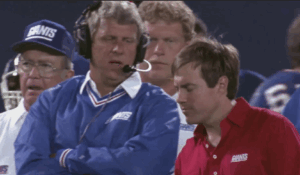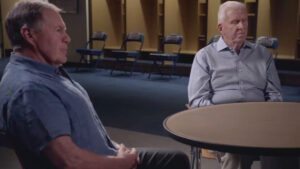Publication Date: 10-25-2025
The Two Bills (2018) review
Dir. Ken Rodgers
By: Steve Pulaski
Rating: ★★★
Between Bill Parcells and Bill Belichick, two coaches in the National Football League who have sustained unbelievable success together and on their own, they have a combined seven Super Bowl titles, two of which coming from their time together. This coming Sunday, February 4th, 2018, that number might go up to eight, as Belichick is in place for yet another Super Bowl victory as the head coach of the New England Patriots, the sixth since he became head coach in 2000. One of the most surprising revelations in The Two Bills, a brand new “30 for 30” documentary chronicling the complicated relationship between Parcells and Belichick, is a simple one: when the two were working for the New York Giants as head coach and defensive coordinator, respectively, if Parcells had told Belichick he was retiring in 1990, it’s highly unlikely the dynasty that is the present day Patriots franchise would’ve even happened. Quarterback Tom Brady probably would’ve been out of the NFL a long time ago too.
No football fan should overlook how much of a treat The Two Bills is as a portrait of two enigmatic and supremely intelligent men who have mastered the game of football. Few people can look at the big picture of a football game, from the perspective of offensive passing plays and defensive schemes, and see it as vividly as Parcells and even fewer could implement the kind of cerebral and unconventional manipulations to ordinary defensive schemes like Belichick. When Belichick finally walks off into the sunset, capping off an unimaginably accomplished career, don’t be surprised if you hear a debate on renaming the Lombardi Trophy to the “Belichick Trophy.” He’s certainly earned it.
But I’m getting ahead of myself. In order for this special documentary to happen, director Ken Rodgers gets Parcells and Belichick into the Giants’ locker-room together for the first time in many years. It’s a rare sight to see Belichick visibly emotional when he revisits old film-rooms and areas where staff meetings where held, overwhelmed with memories of how much time him, Parcells, and the rest of the Giants staff spent conceiving game-plans. Parcells became head coach of the Giants in 1983, with Belichick being hired in 1985 as the team’s defensive coordinator. Success for the men and their team in the form of a tremendous, ’85 Bears-esque playoff run culminated with a Super Bowl victory to cap off the 1986 season. While both coaches, with plenty of hindsight on their side, are quick to commend the efforts of their many talented players (Lawrence Taylor being one of them), no one can deny how exceptional their coaching was in key games.
They continued their dominance to another Super Bowl victory in 1991, a one-point victory over the Buffalo Bills. By this time, however, it was clear that Belichick would likely be moving on from a defensive coordinator to a head coaching job elsewhere. Belichick left to coach the Cleveland Browns the same year, and shortly after his introductory press conference with the team, Parcells surprised everyone by announcing his retirement following a health scare. This sent shockwaves to players, who believed that had Belichick known this, he would’ve been their next head coach; once again, it’s reasonable to believe the Giants would’ve been in for a dynastic run well into the 1990s had their defensive coordinator known the news and gotten the promotion. Instead, Belichick went on to a rollercoaster five-season run with the Browns while Parcells headed to the broadcasting booth, at least until coaching called him back in the form of a job leading the New England Patriots.

Belichick was eventually hired by the Patriots in 1996 as a defensive coordinator, right in the middle of a contentious relationship between Parcells and the new Patriots owner, Robert Kraft. The departure of both men led to their highly controversial and famously checkered tenure with the New York Jets, which ended after three seasons with Parcells announcing his retirement yet again and Belichick presumed to take over as the Jets’ head coach. When Belichick confirmed his resignation from the position after being hired, he was hired by Kraft in New England — not long after Kraft filed an injunction against Parcells for leaving the Patriots to coach the division-rival Jets — and the rest, as they say, is history.
Rodgers and his crew sometimes have a difficult time reiterating the history with a linear timeline, but to be fair, Parcells and Belichick are about as unpredictable as it gets. The film does manage to capture the humorous element of Belichick not once, but twice being named the head coach of the Jets (once during the injunction against Parcells and twice after Parcells’s retirement three years later) and never coaching a game. Rodgers also finds a way to capture the essence of these competitive men that feels earnest rather than sensational. He admirably minimizes his own role in orchestrating their emotionally honest reunion, letting the men speak for themselves in a way that has them justifiably flaunting their egos but also minimizing the bravado that allows them to show what dedication to their craft looks like in its purest form.
Sprinkled throughout the film are interviews with Kraft, Taylor, and numerous assistant coaches that worked alongside the titular men, such as Romeo Crennel, Charlie Weis, and Al Groh (Crennel remains the only active coach in the NFL at this time). These men privilege us with the third-party perspective into the rein of Parcells and Belichick, two men not easily defined, and add to the documentary when they’re called upon in a way that, once again, disregards the potential to be fluffy and fabricated.
The Two Bills concludes poignantly but satisfyingly, as Belichick continues his dominance as head coach of the Patriots about to cap off his 18th season with the team; regardless of the outcome of Sunday’s Super Bowl, his gargantuan status will remain unchanged. Rodgers’s film does what could’ve been perceived as impossible and that’s find a way to bring these two coaching titans down to a level where humanization and perhaps empathy is warranted. The beauty of football, or any professional sport, is that it’s just a game and yet it isn’t, and so much can happen when people’s egos, reputations, images, and careers are on the line. Parcells and Belichick elevated the game yet made it that much more complicated, and to that we owe them and understandably condemn them.
My review of Belichick & Saban: The Art of Coaching (2019)
Directed by: Ken Rodgers.
About Steve Pulaski
Steve Pulaski has been reviewing movies since 2009 for a barrage of different outlets. He graduated North Central College in 2018 and currently works as an on-air radio personality. He also hosts a weekly movie podcast called "Sleepless with Steve," dedicated to film and the film industry, on his YouTube channel. In addition to writing, he's a die-hard Chicago Bears fan and has two cats, appropriately named Siskel and Ebert!


